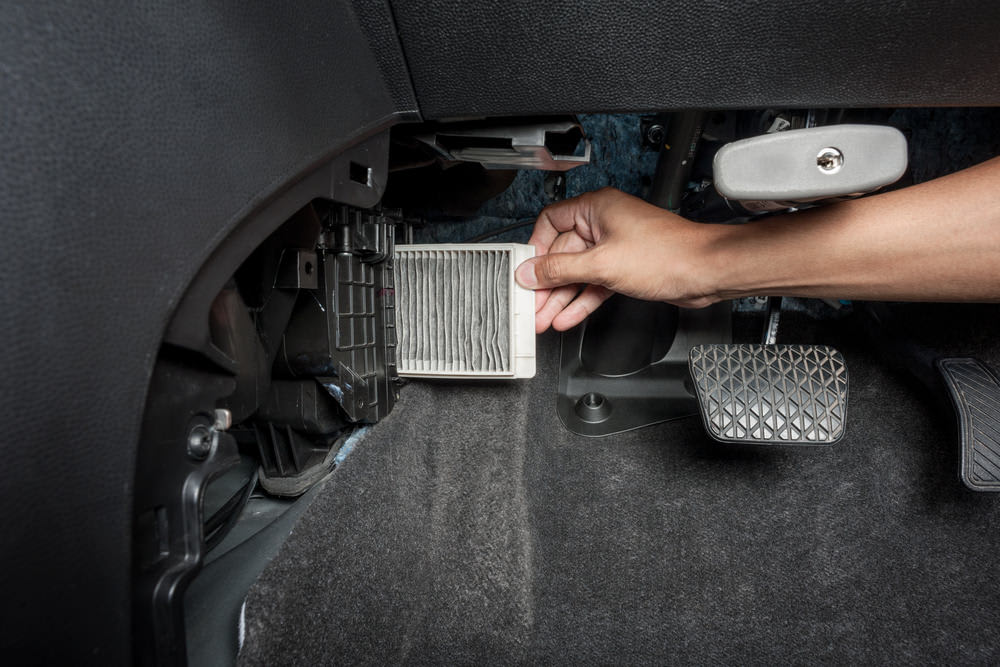

While it is recommended that you change out your vehicle filters on a regular schedule, you can extend the life of some filters by cleaning them. Eventually, though, all filters need replacing, because cleaning them becomes less and less effective. At this point, it is better to have a mechanic change them.
Types of filters
Your vehicle operates with many different types of filters, each one geared toward filtering different things. The intake air filter cleans the air of dirt and debris as it enters the engine for the combustion process. You can find the intake air filter either in the cold air intake box on one side or the other of the engine compartment in newer model vehicles or in the air cleaner that sits atop the carburetor in older vehicles. This cabin air filter helps filter out pollen, dust, and smog as it enters the vehicle from the outside. An intake air filter comes in a variety of filtering materials, including paper, cotton, and foam.
Most newer-model vehicles do not have this feature unless added on as an option by the manufacturer. You can find the cabin air filter either in the area around or behind the glove box or in the engine compartment somewhere between the HVAC case and the blower.
Some other types of filters in your vehicle include the oil and fuel filter. The oil filter removes dirt and other debris from the engine oil. The oil filter sits to the side and at the bottom of the engine. The fuel filter cleans the fuel used for the combustion process. This includes impurities picked up while the fuel is stored and transported to the gas station, as well as dirt and debris found in your gas tank.
To locate the fuel filter, follow the fuel supply line. While the fuel filter on some vehicles sits at some point along the fuel supply line, others are located within the fuel tank itself. Either way, if you think any of the filters on your car need changing, have a mechanic check to make sure.
Replaced vs. cleaned
The most common response to a dirty filter is to have a mechanic replace it. Sometimes, though, you can have a mechanic clean it to extend the life of the filter. But which filters can be cleaned? For the most part, an intake or cabin air filter allows you to easily vacuum or clean it with a cloth, giving you more use out of the filter. Oil and fuel filters, though, need replacing at regular intervals. There really is no way to clean a dirty oil or fuel filter, so replacing a clogged one represents your best option.
An intake filter usually requires changing depending on the maintenance schedule you follow. This is either when the filter starts to look very dirty, every other oil change, once a year, or depending on the mileage driven. Ask your mechanic for their recommended timeline for changing an intake air filter.
The cabin filter, on the other hand, can go longer between a replacement, with cleaning extending the filter's lifespan even further. As long as the filtering medium can still filter dirt and debris, the filter is usable. Even without cleaning, a cabin air filter lasts at least a year before needing a replacement.
The general rule of thumb when it comes to an oil filter is that you need to change it with each oil change. This ensures that it filters the oil as it should. Fuel filters only need replacing when the part stops working.
Signs that a filter needs changing
For the most part, as long as a regular maintenance and replacement schedule is followed, then you should have no problem with clogged filters. In lieu of following an established plan, you can look for certain signs that it is time to change your filters.
Intake air filter
A vehicle with a dirty intake air filter usually shows a noticeable decrease in gas mileage.
Fouled spark plugs represent another sign of an air filter in need of changing. This problem is exhibited by rough idling, misses, and problems starting the vehicle.
Another indicator of a dirty filter is a lit Check Engine Light, which indicates that the air/fuel mixture is running too rich, leading to a buildup of deposits within the engine.
A decrease in acceleration due to the restricted air flow from a dirty air filter.
Cabin air filter
A reduction in the air flowing to the HVAC system is a strong indicator that you need to have a mechanic change the cabin air filter.
The fan having to work harder, exhibited by increased noise, means the air filter needs replacement.
A musty or bad smelling order emanating from the vents when turned on also indicates it time to have the air filter changed.
Oil filter
When you change the oil filter depends on the condition of your oil. Oil that is black usually indicates it is time to have the oil changed along with the filter.
Engine sounds can also mean the parts are not getting the proper amount of lubrication. In addition to needing the oil changed, this can also indicate a clogged filter.
If the Check Engine or Check Oil Light comes on, chances are you need to have the oil and filter changed.
Fuel filter
A roughly idling engine can indicate that you need to have your fuel filter replaced.
An engine that does not turn over can indicate a clogged fuel filter.
Difficulty starting the engine might signal a fuel filter on the way out.
Engines that die while driving or struggle to gain speed while you push the gas can also indicate faulty fuel filter.



